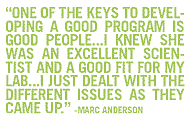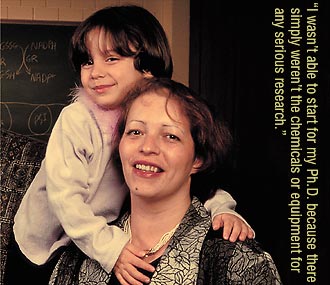On a momentous Thursday in early October, Ana Simonovic watched from her window as more than half a million fellow Yugoslavians demonstrated in downtown Belgrade. Earlier, she had been in the crowd that was demanding the ouster of Slobodan Milosevic, the iron-fisted autocrat who Serbians voted out less than two weeks before, but who refused to concede power to opposition leader Vojislav Kostunica.
From her office at ANOXSoft, an international software company where she worked as a Web developer, Simonovic described the scene in an email.
There were, and still are, approximately 500,000-700,000 people in front of the parliament building and all around downtown, she wrote. I think the whole grown-up population in Belgrade is there, similar to all towns in Serbia. The opposition demonstrators have occupied both parliament and state TV buildings and some other TV and radio stations. Some buildings are burning! It's total chaos. I'm still in the office downtown, and I'm not sure how to go home. Please pray for us.
The following month Simonovic left the upheaval in her country behind to begin anew, working as a graduate assistant with Marc Anderson, an assistant professor of botany/biology at North Dakota State University, in what she called her life opportunity. It was a long road from Belgrade to Fargo, one paved with Anderson's exceptional assistance and a trust that developed between the assistant professor and his future student.
 At the beginning of 2000 Simonovic was a research assistant in a laboratory for seed germination and photomorphogenesis at the Institute for Biological Research Sinisa Stankovic in Belgrade. Although she had completed her master's degree in biological sciences and plant physiology at the University of Belgrade two years earlier, the economic situation in Yugoslavia severely limited funds for research, making it nearly impossible to pursue a doctorate.
At the beginning of 2000 Simonovic was a research assistant in a laboratory for seed germination and photomorphogenesis at the Institute for Biological Research Sinisa Stankovic in Belgrade. Although she had completed her master's degree in biological sciences and plant physiology at the University of Belgrade two years earlier, the economic situation in Yugoslavia severely limited funds for research, making it nearly impossible to pursue a doctorate.
During her four years in the lab, Simonovic watched as first one, then another of her colleagues left the country; a laboratory of 30 dwindled to only a handful of people. The researchers who remained coined a phrase for the exodus: decantation of brains.
It's terribly sad, and this is what's been happening for years in Yugoslavia, not only in biology but in all technological fields, she said. The misfortune of my generation is that we live in a really poor country with a 10-year prolonged civil war, economic crisis and instability, with miserable funds for science. I wasn't able to start for my Ph.D. because there simply weren't the chemicals or equipment for any serious research.
She searched the Internet for graduate assistantships abroad, but with each opportunity she ran into barriers such as the need for Graduate Record Exam and Test of English as a Foreign Language scores. The American cultural center in Belgrade that had administered those exams was closed, and she would need to travel to Budapest, Hungary, to take them. As a single mother on a severely limited budget, she could barely afford a train ticket, let alone exam fees. Some professors initially showed interest, but not one was willing to help with those details.
Simonovic kept looking. When you live in a pretty poor country and your dream is to be a scientist I don't say that I am, but that is my dream I always wanted to work in a well-equipped lab and get the things I need for research and to one day get my Ph.D. In January she saw Anderson's advertisement for a graduate assistant on the American Society of Plant Physiologists Web site.
 Anderson, who joined the NDSU Department of Botany/Biology in 1999, was searching for the first graduate student to help get his laboratory off the ground. He needed someone with the right combination of education and research interests to complement his research involving changes in plant metabolism in response to low temperature stress. Twenty-one students, primarily from overseas, applied for the position. Simonovic, who also holds a bachelor's degree in molecular biology and physiology from the University of Belgrade, was Anderson's first choice. Alan White, current dean of science and mathematics, and Marvin Fawley, professor of botany, independently selected Simonovic as the top candidate.
Anderson, who joined the NDSU Department of Botany/Biology in 1999, was searching for the first graduate student to help get his laboratory off the ground. He needed someone with the right combination of education and research interests to complement his research involving changes in plant metabolism in response to low temperature stress. Twenty-one students, primarily from overseas, applied for the position. Simonovic, who also holds a bachelor's degree in molecular biology and physiology from the University of Belgrade, was Anderson's first choice. Alan White, current dean of science and mathematics, and Marvin Fawley, professor of botany, independently selected Simonovic as the top candidate.
Her background and career goals are closely aligned with what I am working on, said Anderson. She is primarily interested in signal transduction mechanisms in plants, a broad interest area that can easily be studied within the context of my projects.
In early March 2000 Anderson e-mailed Simonovic an informal invitation to apply for graduate study at NDSU. Like the other professors, he requested exam scores before formalizing the invitation. Her response provided a glimpse of the challenges to come.
 Unfortunately, I can't send you GRE and TOEFL scores yet, simply because I haven't had enough money for traveling abroad for the tests, she wrote. Believe it or not, but as a research associate I have, converted, about $70 per month, so I have to work two months for just the application fee and transcript evaluation.
Unfortunately, I can't send you GRE and TOEFL scores yet, simply because I haven't had enough money for traveling abroad for the tests, she wrote. Believe it or not, but as a research associate I have, converted, about $70 per month, so I have to work two months for just the application fee and transcript evaluation.
Anderson had made up his mind to do whatever it took to get Simonovic into his lab. He responded the next day, saying that, although foreign students are usually responsible for all expenses, he would be willing to cover some of them with start-up funds for his research program, including travel to the United States.
One of the keys to developing a good program is good people, he said. Once I saw her information and I had a chance to talk to her, I knew she was an excellent scientist and a good fit for my lab. There were a couple of other decent candidates, but once I committed to Ana, I just dealt with the different issues as they came up.
There were plenty to overcome. Anderson had to make certain he could use a portion of his start-up funds to pay for Simonovic's expenses. He then arranged to pay for her exams in Budapest and coordinated with her and the testing center on a test date. He also arranged to pay for her NDSU application fee and transcript evaluation, for her to submit her graduate application without the necessary test scores and to supply them later.
Anderson and Simonovic also learned to trust one another. One test came early in the process when Simonovic was offered the job at ANOXSoft,a position that would mean a tenfold increase in her monthly salary. With all the uncertainty with the NDSU position, she felt she had to take it. She informed Anderson of the opportunity, saying that if attending NDSU could not be worked out in 2000, the job would provide the financial means for her to apply in 2001. The assistant professor replied with some trepidation; he didn't want to pay for Simonovic's exams only to have her take a position elsewhere.
She took the job on a short-term basis but assured Anderson of her intentions. When if we solve the financial problems about the application, TOEFL and traveling, and when if NDSU accepts my application, I'll quit with ANOX and come to the United States, she wrote. Your project is my life opportunity, and I'll do my best to get it, but if I fail I have to have some option.
In the ensuing weeks they traded dozens of e-mails. I imagine that you spend way too much time on organizing everything for me. I'd die of embarrassment if I fail on the exams or if I disappoint you in any way, she wrote in late March. It seems that you believe in me more than I believe in myself. As you evaluate my personality from our correspondence, I do the same, and I'm simply astonished with your kindness and generosity.
She needn't have worried about passing the exams; her scores were higher than required. In fact, her TOEFL score surpassed the high language standards required for teaching assistants at NDSU.
Throughout the summer and early fall, they continued to work through the details of applying to NDSU, obtaining a visa, travel plans and purchasing airline tickets. Anderson reserved an on-campus apartment for Simonovic and her four-year-old daughter, Milica, and arranged for childcare. In early October, about the same time Milosevic was stepping aside, Simonovic was admitted to NDSU. She received her visa a few weeks later.
In November Simonovic was selected for one of the first Presidential Doctoral Graduate Fellowships awarded on campus. The fellowships are for $16,000 per year plus waiver of tuition for up to four years. President Joseph A. Chapman announced the creation of the fellowships in his 2000 State of the University Address. The fellowships help attract exceptional doctoral students like Simonovic and provide NDSU a boost in achieving Doctoral and Research University-Extensive designation. The Carnegie Foundation for the Advancement of Teaching defines that as an institution that grants 50 or more doctoral degrees per year in at least 15 disciplines.
Within a week of her arrival Simonovic had decided on a specific line of inquiry, research that is building on what Anderson did while completing his doctorate. We're about to make a library of genes that are differentially expressed upon acclimation to low temperature stress and to see what the products of those genes are, she explained. Some of them are known to be antioxidant enzymes, but many of those products are yet unknown. We will try to elucidate those products.
Her immediate focus provided Anderson some assurance that his extra efforts had been worthwhile. It was great that, within days of getting here, she already knew what she wanted to do, he said. But I already had a good idea of her aptitude and excitement for my projects from our previous correspondence. I really don't think I've done anything above and beyond what a good adviser should do.

Ana Simonovic and her daughter
In February Simonovic returned to Belgrade to retrieve her daughter, who was living with family. She plans to return to Yugoslavia once she has completed her doctorate and perhaps a year of post-doctoral work. But that's for the future, she said, and four years is a long time. For now, she's realizing her dream under the guidance of her new mentor.
Everything the best about Dr. Marc, Simonovic said. Like all university professors he's an authority, but he's also a friend.
M. Fredricks

































